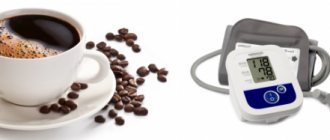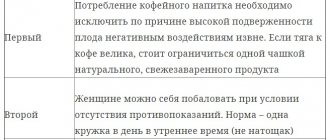Dietary restrictions for pregnant women and nursing mothers are justified by concern for the health of the child. Coffee is not prohibited during breastfeeding, but the consumption of the drink is dosed in accordance with the requirements of pediatricians.
Introducing the product into the diet without monitoring the child’s condition is not allowed. Nursing mothers need to know when to allow themselves their favorite invigorating drink and how much to drink so as not to harm the baby.
We invite you to get acquainted with information about the effect of coffee drinking on the health of a baby, after which you will understand whether nursing mothers can drink coffee and whether it is worth giving it up.
What effect does drinking coffee have on a baby?
The drink contains caffeine, which has an invigorating effect. A woman needs this because every day is a busy day, but she is worried that the child will not sleep well.
This is the first myth that has nothing in common with reality. Tea also contains caffeine, but drinking it is not prohibited, but is recommended to increase lactation.
Is it possible for a nursing mother to drink coffee, if it has been proven that it affects the brain, will the child become mentally retarded? Doctors say that in order for the drink to have an effect on the baby’s brain, it must be drunk a lot and often. That is, this is also a “horror story”, but not an explanation for limiting the use of the product.
But the fact that caffeine is not absorbed and excreted through natural feces by the child’s body is not a myth. Therefore, you should not abuse drinks containing it.
Caffeine is found not only in coffee, but in tea, especially green tea, chocolate, and cocoa. A stricter consumption ban applies to chocolate and green tea.
To avoid negative consequences for your child, monitor your baby’s reaction in the first couple of hours if you have consumed the drink yourself. This is important because coffee is considered an allergen, and a child may develop dermatological or other problems from it.
Is it possible to drink coffee while breastfeeding: the effects of caffeine
Caffeine has a number of restrictions (starting from the 3rd trimester of pregnancy) on the amount of permissible daily dose due to the high half-life of caffeine in children under 6 months of age [13].
Effect on the baby: caffeine in breast milk
The research results are as follows:
- Caffeine does pass into breast milk, but the baby receives about 1-1.5% of the amount of caffeine that the mother receives [1, 5].
- The appearance of a large amount of caffeine in the body makes the child restless, prone to agitation, tearfulness, disrupts sleep, and affects appetite [2].
- The half-life of caffeine is about 97.5 hours in a newborn, 14 hours in a child 3-5 months old, and 2.6 hours in a child older than 6 months. By comparison, the half-life of caffeine in an adult is 4.9 hours. To completely remove a substance from the body, five half-lives are required, i.e. up to 20 days. [13]
- Peak levels of caffeine in breast milk are detected 60-120 minutes after a woman drinks coffee [4].
- Caffeine is harmful during lactation, as it reduces the amount of milk produced by the mother - this opinion is controversial and has no evidence. On the contrary, one study shows caffeine's ability to stimulate breast milk production [8].
In a 1984 study, 15 breastfeeding mothers took a drink containing caffeine in amounts ranging from 35 to 336 mg. Caffeine was not detected (<0.2 mg/L) in the urine of any of their infants during the 5-hour collection period, which began 2 hours after breastfeeding. [4]
Conclusion : A nursing mother's intake of one cup of coffee (up to 300 ml) does not appear to provide significant amounts of caffeine to the infant [4].
When to stop using
There are cases when the consumption of the drink must not only be limited, but also excluded from the mother’s diet:
- The child was born weak, prematurely.
- The appearance of an allergic reaction, rash on the baby’s skin.
Some people believe that the acids in coffee may reduce the iron content of breast milk, although there is no scientific evidence to support this.
Still, taking into account the above points, nutritionists are inclined to believe that you can drink coffee during breastfeeding if you follow certain recommendations.
7 rules for a nursing mother: safe consumption
Coffee-consuming breastfeeding mothers need to know the following information:
- Newborns may be especially sensitive to caffeine (due to long processing times). However, by the age of six months, it may take only 2-3 hours for a baby to digest caffeine. [5]
- The authors of a prospective cohort study concluded that limiting caffeine for a nursing mother (no more than 300 mg per day) is reasonable [6].
- Try switching to decaffeinated drinks for a week or two to see if it makes any difference. If caffeine is affecting your baby, you should notice a difference in their behavior within 3-7 days. [1]
- It is better to grind the beans immediately before brewing: in a product ground industrially, the specific gravity of caffeine is higher.
- Avoid the drink if you are simultaneously taking medications with caffeine.
- Limit or exclude products containing caffeine: cola, cocoa, chocolate.
- Irritability, poor sleep, moodiness, and fussiness have been reported in infants of mothers with very high caffeine intake: about 10 or more cups of coffee per day (more than 750 ml) [7].
Not a single official medical source prohibits a nursing mother from drinking coffee in the first month (if the recommendations are followed). However, the UK National Health Service advises limiting caffeine intake to 200 mg/day. [9, 11]
Amount of caffeine in different products:
- espresso: 145 mg per 50 ml;
- filtered coffee mug: 140 mg;
- mug (250 ml) instant coffee: 80 mg (1 tsp per mug);
- can (250 ml) energy drink: 80 mg (large cans may contain up to 160 mg caffeine);
- cup of tea: 75 mg;
- 1/2 pack (50 g) plain chocolate: up to 50 mg;
- can of cola (354 ml): 40 mg.
You can read about other sources of caffeine on the website of the international committee on breastfeeding [12].
Harm and benefits of the drink during breastfeeding
Is it possible for nursing mothers of newborns to drink coffee and how will the baby feel if he receives “coffee” milk? This is a question that requires a specific answer:
- If the drink is consumed frequently, the child may become nervous.
- If the mother does not check whether the newborn tolerates the components included in the drink, this is fraught with allergies.
- Coffee drinks dehydrate the body as they affect water metabolism.
- Coffee promotes accelerated excretion of beneficial microelements, including calcium, which is necessary to strengthen the skeletal system.
We are not talking about one cup; such a dose will not cause serious consequences. But coffee in large quantities during breastfeeding will definitely cause the listed effects.
If you drink coffee after breastfeeding, the risk of negative consequences for the baby is reduced significantly.
Coffee - benefits and harm
The question of whether coffee is ok while breastfeeding is decided individually.
A small cup of a drink made from high quality grains will not cause harm to your health. Coffee is used to cheer up. The drink has a stimulating effect on the nervous system. It is indicated for hypotension, as it helps increase blood pressure and can relieve migraines. The composition includes vitamins and amino acids.
Excess is harmful. If you drink coffee in unlimited quantities, you will create unnecessary stress on the heart. Coffee is contraindicated for hypertension. Excessive consumption can cause caffeine addiction.
The effect of caffeine on the baby
The appearance of side effects and dangerous consequences is possible when drinking coffee regularly while breastfeeding in large quantities. Caffeine will enter the baby's body through mother's milk. The negative effect of coffee on the baby’s body can manifest itself in the following:
- Caffeine is eliminated from the body of an adult within 5 hours. During the first 2 years of a baby’s life, his digestive system does not process harmful substances and does not eliminate them. The substance accumulates. Because of this, the child may be too excited, capricious, and misbehave.
- An allergic reaction is possible. Caffeine is not a strong allergen, but in rare cases, individual intolerance, an allergy to coffee, may occur. The diuretic effect can also cause harm to the baby: the child will experience dehydration, and useful substances will be washed out of the body with urine.
- The stimulant is dangerous for babies because it reduces the amount of iron in breast milk. This can cause the newborn to become anemic.
The reaction is individual and may be absent. Negative consequences are possible, but there is a high probability that the child’s body will respond normally to a small dose of caffeine.
Coffee ingested through breast milk can cause your baby to become capricious.
How to choose the right one
The criteria for choosing a product are its quality, taste, aroma.
When purchasing coffee varieties, focus on the characteristics:
- naturalness of grains;
- manufacturer of products, the best varieties are branded.
To the question is it possible to use instant coffee while breastfeeding, there is only one answer - it is not possible. For the production of secondary products, inferior grades are used; during processing, they contain impurities and chemical components, which is dangerous for a newborn baby.
Advice from consultants. Drink only coffee brewed from beans. Beware of any surrogates in the form of powders or granules. The use of low-quality products contributes to the fact that harmful substances involved in industrial processing penetrate into the baby’s body, causing allergies.
Which coffee is better to choose when breastfeeding?
Instant coffee is made from low-quality beans that are processed at high temperatures and chemicals. It has a high caffeine content. The likelihood of an allergic reaction is higher than with natural coffee.
Decaf coffee, a separate product category. It still contains caffeine, in smaller quantities, but it is there. The beans are chemically treated, so the likelihood of allergies and disorders in a child is the same as with insoluble coffee.
The best cup of coffee is considered to be one made from freshly ground beans. It is considered the most natural product.
Can I have decaffeinated coffee?
There is no drink called coffee without caffeine content. In this case, we mean a low content of this substance. Such varieties are commercially available; any well-known brand produces a line with a reduced level of active ingredient.
It is preferable for a nursing mother to drink weak coffee, since it has a negligible effect on the baby. If it is permissible to drink a cup of strong drink, then the so-called decaffeinated drink is allowed to drink two per day. But it is not recommended to use the second one immediately after the first or after a short period of time.
Impact of “coffee” milk
Numerous studies have confirmed that caffeine from the body of a mother who has treated herself to a cup of her favorite drink inevitably enters the baby’s body along with mother’s milk.
At the same time, the child’s body does not yet “know how” to cope with this substance, and it can accumulate in the baby’s body day after day, which leads to a number of negative consequences:
- Dehydration, which occurs due to the diuretic effect of the drink. In addition, calcium and some other substances necessary for the growth and development of the child leave the body along with water.
- Allergic reactions , manifested in the form of difficulty breathing, swelling or rashes on the skin. Therefore, mothers who cannot do without coffee need to monitor the child’s condition very carefully.
- Constipation , which can result from dehydration of the baby’s body.
- Nervous agitation and sleep disturbance . It is necessary to take into account that if you are breastfeeding and drank a cup of coffee for the first time during the entire lactation period, then all of the listed consequences may not occur. However, if drinking coffee becomes regular, you should be prepared for unpleasant surprises - whims, sleep disturbances and nervousness of the baby.
- Incompatibility with some medications. The problem is that some of the medications the doctor prescribes for your baby also contain caffeine. Therefore, when prescribing medications, inform the doctor about drinking coffee in order to prevent an overdose of caffeine in the baby’s body.
Green coffee
Unroasted beans are healthier than those that have been cooked. They preserve the natural vitamin and microelement complex. This is a product that has a fat-burning effect, so women after childbirth use it to get rid of extra pounds.
Can nursing mothers drink coffee without restriction if it is brewed from green beans? Despite the low caffeine content in it, the answer is no, the drink should be consumed in doses. It is recommended to prepare it from natural raw materials; avoid ground and freeze-dried products. Choose beans that are pale greenish with beige tones.
Dietary supplements for weight loss with the addition of green grains are prohibited for breastfeeding women.
The benefits of coffee for nursing mothers
In reasonable quantities, natural coffee can even be beneficial for mothers. Roasted coffee beans contain more than 300 different essential compounds, which makes this drink rich, fragrant, and at the same time low in calories.
- Coffee beans are rich in carbohydrates. These substances are energetically valuable for the body. In the composition of the drink they are represented by simple sugars (fructose, sucrose) and complex polysaccharides (fiber, cellulose, pectin substances). Carbohydrates are an indispensable basis for the nutrition of nerve cells in the brain.
- Coffee contains several minerals that are important for the body of every person, and especially for nursing mothers: phosphorus, magnesium, iron, calcium and potassium. These inorganic elements ensure stable functioning of the muscular system, are part of the bones, and actively regulate the functioning of the brain, blood vessels and heart muscle.
| Composition of instant coffee drink (100 g) | |
| Substance | Quantity |
| Fats | 0.7 g |
| Squirrels | 0.3 g |
| Carbohydrates | 0.2 g |
| Potassium | ≈ 70 mg |
| Calcium | 5 mg |
| Phosphorus | 7 mg |
| Vitamin PP | 0.6 mg |
| Iron | 2 mg |
Note! The drink contains about 1-1.5% of the total weight of the coffee component. But even this small amount is enough to demonstrate its tonic effect on the human body.
Rules of use
The coffee drinking regimen recommended by lactation consultants must be strictly observed:
- Brew your own coffee, skip the ready-made bistro cups.
- To reduce caffeine levels, brew the product more often and let it steep.
- Start introducing coffee drinks gradually into your diet; do not drink it in the first month. In the second month, try drinking a cup a day.
- When you are sure that “coffee” milk is not harmful to your child, you can allow yourself a couple of cups a day.
- Do not time drinking coffee with feeding; the later after drinking you breastfeed the baby, the less the effect of caffeine.
- Drink a glass of water for every coffee you drink to reduce dehydration.
- When mixed feeding, choose formulations that do not contain components that are identical in action to caffeine.
Can a nursing mother drink coffee with milk, why is it healthier? Doctors note that calcium for the child and mother is a stabilizer of the level of microelements that are actively excreted during coffee drinking. Milk also reduces caffeine levels, which has a double benefit.
Doctors' opinion
Is it possible to have decaffeinated coffee while breastfeeding? In general, doctors answer this question in the affirmative. In America, mothers are not prohibited from doing anything at all, domestic specialists prefer to play it safe, and old-school doctors urgently demand that they give up coffee altogether, without understanding the varieties and characteristics.
In fact, decaffeinated coffee still contains caffeine, albeit in the smallest doses: usually 97% is removed, in the European Union the requirement is 99.9%. That is, 0.1% remains, 5-10 mg, as in cocoa. This is very little, especially considering that a cup of green or black tea can contain 40-80 mg of caffeine. It is also found in cola, chocolate, citramone, and many medicines. That is, the dose is really low, and with adequate consumption you will not harm either yourself or your child.
Like any new product, a decaffeinated drink can cause allergies. Start with one small cup, a few sips, and monitor the child's condition. Try drinking coffee once a week for a month, and each time monitor the child’s body’s reaction.
Komarovsky's opinion
What does Dr. Komarovsky say about whether you can drink coffee while breastfeeding? Mothers follow his advice on feeding their children.
He developed criteria for the inadmissibility of drinking coffee by nursing mothers:
- if a rash appears from “coffee” milk, immediately eliminate the drink from your diet;
- Have you noticed that after drinking a drink and feeding your baby, he becomes restless and his sleep is disturbed;
- prohibition for medical reasons when a child is treated with drugs containing caffeine, for example, theophylline for lung diseases.
If the listed factors are absent, mothers with breastfeeding are allowed to drink coffee, says the famous pediatrician Komarovsky.
Now you know why you need to limit your drink consumption, whether you can drink more than two cups of coffee while breastfeeding, and from how many months it is permissible to introduce coffee drinking into your diet. Follow the recommendations and indulge yourself, but do not overuse the drink to keep your baby healthy.
Looking for an alternative to coffee
If a mother or child has contraindications to its use, it is recommended to exclude coffee from your diet (at least temporarily).
But what to do if mom loves him very much or one or two cups a day is not enough for her? In this case, you can find an alternative to coffee.
Substitutes for this drink are:
- chicory. It contains many vitamins, macro- and microelements, as well as many other useful components. This drink has a calming effect on the nervous system, gastrointestinal tract, improves metabolic processes in the body;
- barley drink. One of its important advantages is increased lactation. It contains proteins, vitamins, plant fiber, and mineral salts. Barley drink improves the functioning of the kidneys and digestive system;
- acorn coffee. This drink contains a lot of protein, tannic acids, starch substances, and plant flavonoids. Thanks to which it has an anti-inflammatory, antibacterial effect, and acorn coffee normalizes the functioning of the cardiovascular, nervous, respiratory and digestive systems.











